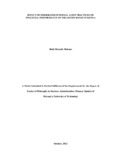| dc.description.abstract | The application of ongoing financial management reforms seeks to enhance and improve the performance of various organizations. In the last decade, performance of Kenyan banks, in terms of rate of increase in profits before tax has been 20% below the industry average. The banks' capacity to improve this level of performance has proven to be an area of concern and therefore, banks have enhanced the use of internal audit practices. The research investigated the effect of moderated internal audit practices on the financial performance in the NSE listed banks in Kenya. The specific objectives of this study were to; analyze the effect of adoption of ISAs; evaluate the effect of independence of internal audit; assess the effect of audit committees’ operations; examine the effect of internal control systems on financial performance of NSE listed banks in Kenya; and to investigate the moderating effect of CBK regulations on the effect of internal audit practices and financial performance of NSE-listed banks in Kenya. The study was anchored on the attribution theory, and further supported by the contingency and agency theories. The research adopted descriptive and correlational research approaches. The regression and structural equation models were adopted. A census survey was used for the banks. Stratified sampling was done to identify the different departments in the listed banks, while purposeful sampling was applied to deduce a representation of the participant departments of 44. Questionnaires were used to collect the main data from the 11 NSElisted banks in Kenya, while data extraction techniques were used to obtain secondary data to collect data for financial performance from the CBK annual supervisory reports. Likert collected responses from questionnaires were analyzed while quantitative data analysis was deduced using both descriptive and inferential statistics. The research findings showed that independence and internal controls have a statistical effect on financial performance in Kenya's NSE-listed banks, while the unmoderated ISAS and the audit committee had no statistically significant effect. The R squared for the independent variables showed a good fit with relatively low values of ROA and ROE at 20.2% and 19.5% respectively. The F statistic was also significant for the two variables on independence and internal controls. The R squared for the CBK regulations moderating effect also showed a good fit with relatively high values of 76.2% and 61.1% respectively for ROA and ROE. It was also evident that the moderating effect of the CBK regulations affected the internal audit practices, and specifically the ISAs. Internal audit aids boards of directors in carrying out their governance responsibilities, resulting in enhanced performance and competitiveness. Corporate success and a well-governance structure are inextricably intertwined. This study therefore recommends the continuous adoption of ISAs and ensuring independence of internal audits to keep improving the NSE-listed bank’s financial performance. The internal auditors’ members should be hired on merit, receive regular training, and include a reporting channel identified that will protect independence and objectivity. Further, the study recommends that there should be policies to guide audit functions, remunerations and fees charged to improve NSE-listed banks performance. The study also recommends on adoption and employment of internal control systems. A recommendation to study other internal audit practices apart from these studied on the financial performance of the NSE-listed banks in Kenya is imperative and another field that can be explored. | en_US |

